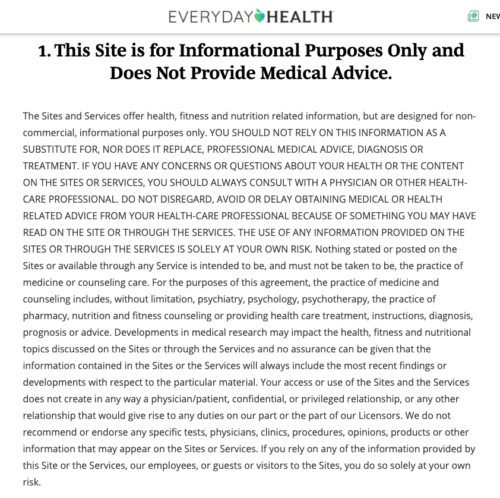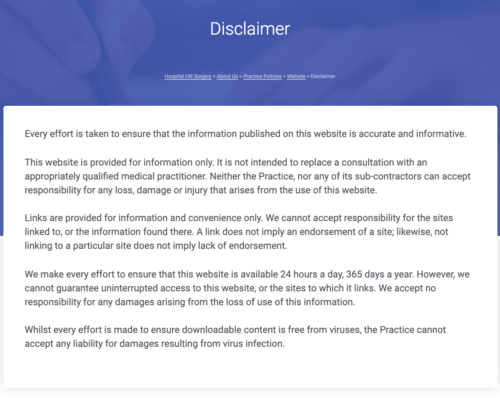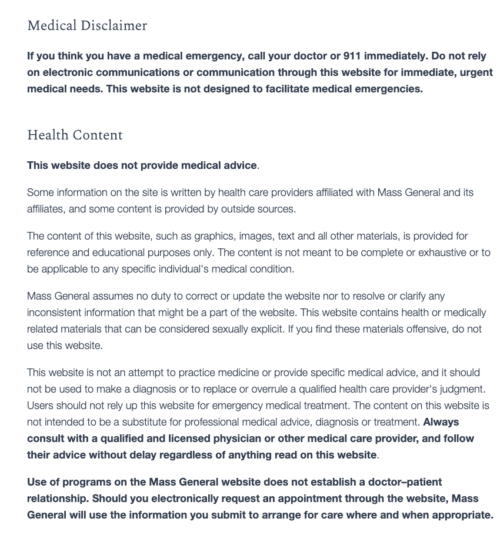The Data Protection Act (DPA) 2018 is the UK's updated data protection law which became effective on 25th May 2018 and was recently amended on the 1st January 2021 to reflect the United Kingdom's exit from the EU. It sits alongside the UK GDPR and replaces the Data Protection Act 1998. The United Kingdom is […]
Medical Disclaimer with Examples
What is a Medical Disclaimer and who should be using it?
A Medical Disclaimer is is a notice on your website that informs your readers that the information you are providing is for informational purposes only. If your website offers articles on medical and/or health tips then it is advised that you include a medical disclaimer on your website.

On this page
What is a Medical Disclaimer
A medical disclaimer is a legal statement that helps reduce liability for informational content on medical and health topics. It informs users on your site that the information that you are providing is for informational purposes only and does not constitute professional advice.
Like other disclaimers, a medical disclaimer aids in reducing liability should a reader decide to pursue legal action based on your website content.
Although a medical disclaimer is not legally required it is advisable.

Who Should Use a Medical Disclaimer?
Any website that includes health and medical information needs a medical disclaimer. These include:
- health, medical and wellness blogs: writing about health, medical and wellness topics often includes information or suggestions on how you could improve your health or medical condition. To help reduce any chance that your readers may think you are offering them advice and then later bringing legal action against you, including a medical disclaimer on your website can reduce your legal liability.
- medical centers and doctors websites: websites that belong to medical centres and doctors often include articles relating to medical and health topics. It is important that these websites include a medical disclaimer. (see below for an example from Hospital Hill Surgery in Scotland)
- hospital websites: hospital websites often contain information on a variety of medical topics and therefore should include a medical disclaimer. (see below for a sample from Mass General's website).
- websites belonging to pharmaceutical companies: pharmaceutical companies offer information on how their drugs can aid in treating various medical conditions and therefore require a medical disclaimer to help reduce any liability. (see below for an example from Pfizer)
- government medical websites: Government medical websites include articles that give information on a variety of health topics, these websites therefore inform their readers that the medical information is for informational purposes only. (see below for an example form the AMA)
Examples of Medical Disclaimers
Below are examples of medical disclaimers taken from various types of medical websites that show the importance of including this type of disclaimer on your website.
Health, Medical and Wellness Blogs
Health blog everydayhealth.com includes the following disclaimer on their website:

Medical Centers and Doctors Websites
Below is an example of a medical disclaimer taken from Hospital Hill Surgery website in Scotland.

Hospital Websites
Below is an example of a Hospital website medical disclaimer from Mass General Hospital in Massachusetts U.S.A.

Pharmaceutical Companies Websites
Pharmaceutical giant Pfizer include this medical disclaimer in their website:

Government Medical Websites
The American Medical Association (aka the AMA) has a website that contains information on health and medical topics. The following disclaimer can be found on their website:

Conclusion
Medical disclaimers, like all disclaimers, help to reduce the liability of a website in the case of legal action. Medical Disclaimers are useful for any website that contains information regarding medical and health topics. These include medical blogs, government medical websites, medical center websites, pharmaceutical websites and websites belonging to hospitals.
Our disclaimer generator contains a lawyer drafted medical disclaimer, which will help to reduce legal liability for your website.
Disclaimer
The information in this article is for informational purposes only and should not be construed as legal advice on any matter and does not create a lawyer-client relationship
